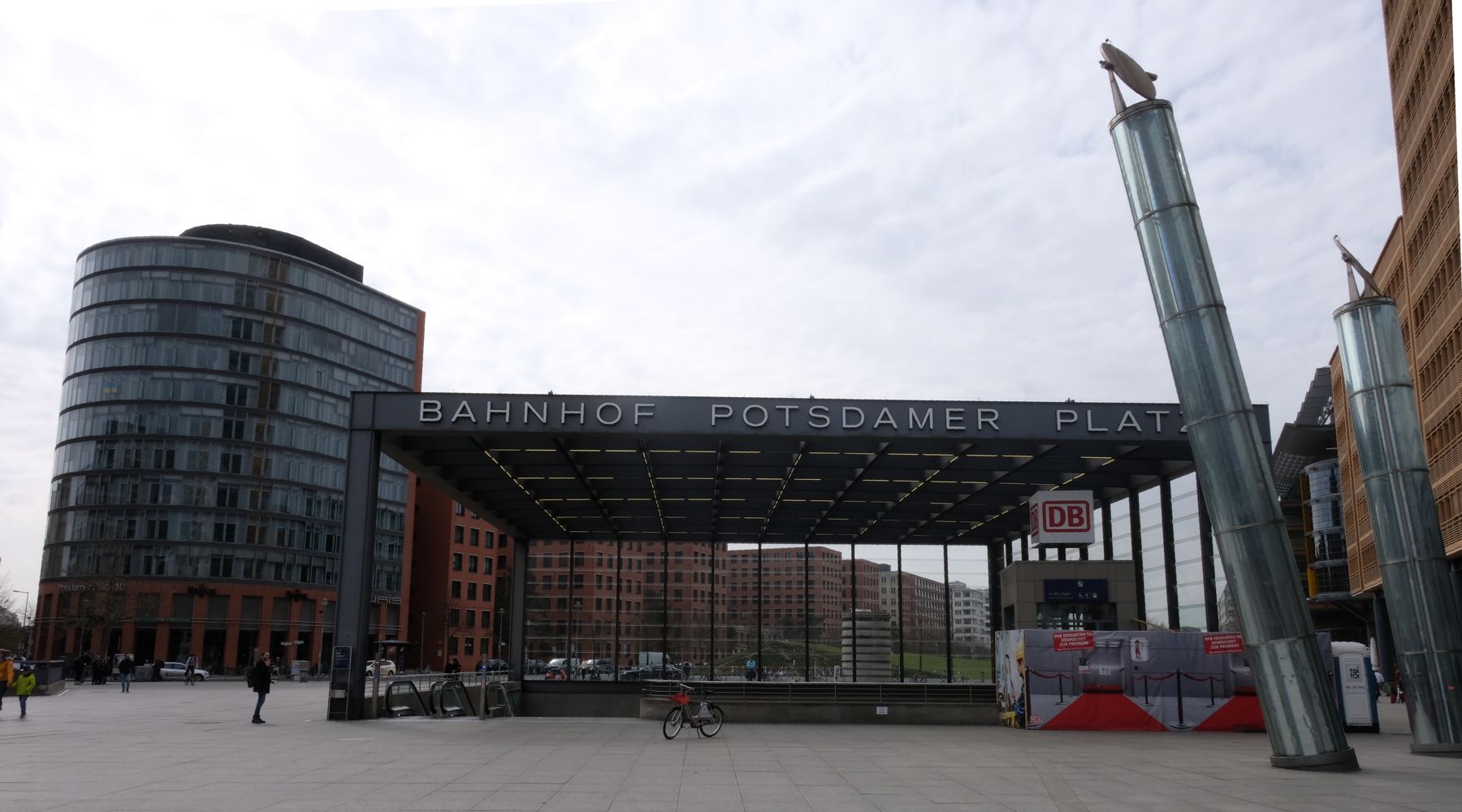
Potsdamer Platz.
Reflections on Berlin
Berlin, Germany - April 2022 - by Jeffrey
Ira had to take a business trip to Berlin and there is (at the time of writing) a possibility we will move there. So, I decided to tag along, look at housing possibilities, re-explore the city and try not to behave too smugly towards Ira who was working while I was playing.
Now, I should explain that Berlin and I have a history and it is not an entirely cheerful one. In 1986, for reasons I cannot remember, I decided to move from Lisbon, where I had been teaching English, to Berlin to become an artist. That was the plan. I didn't stick to the plan. Instead, I ended up sinking into a clinical depression and fled the city after a half year or so.
Aside from flying in briefly to speak at conference in 1999 or 2000, I stayed away from the city until 2009 or so when I was dating a woman who originally came from East Germany, though she was living in Brussels at the time. I'll call her "D" (we split up more than a decade ago and I am sure she would not want me using her name in this blog). Twice, we spent New Years in the city, visiting her family and friends as well as doing a bit of shopping and seeing bits of old East Berlin that were meaningful for her. She also shared stories about her childhood and adolescence in Berlin; she was 17 when the Wall fell. Her stories were not always cheerful. For example, as a teenager she signed a petition related to a friend. This simple action resulted in a visit from the STASI (the East German secret police) and being restricted in what she would be allowed to study at university (fortunately, after the wall fell, she was free to study what she wished, of course). We, especially those of us who grew up in the West, easily forget how lucky we are to enjoy freedom of speech.
So, based on these three limited experiences in Berlin, at different points in the city's recent history, here are some eclectic and random observations of Berlin, Berliners and other Germans.
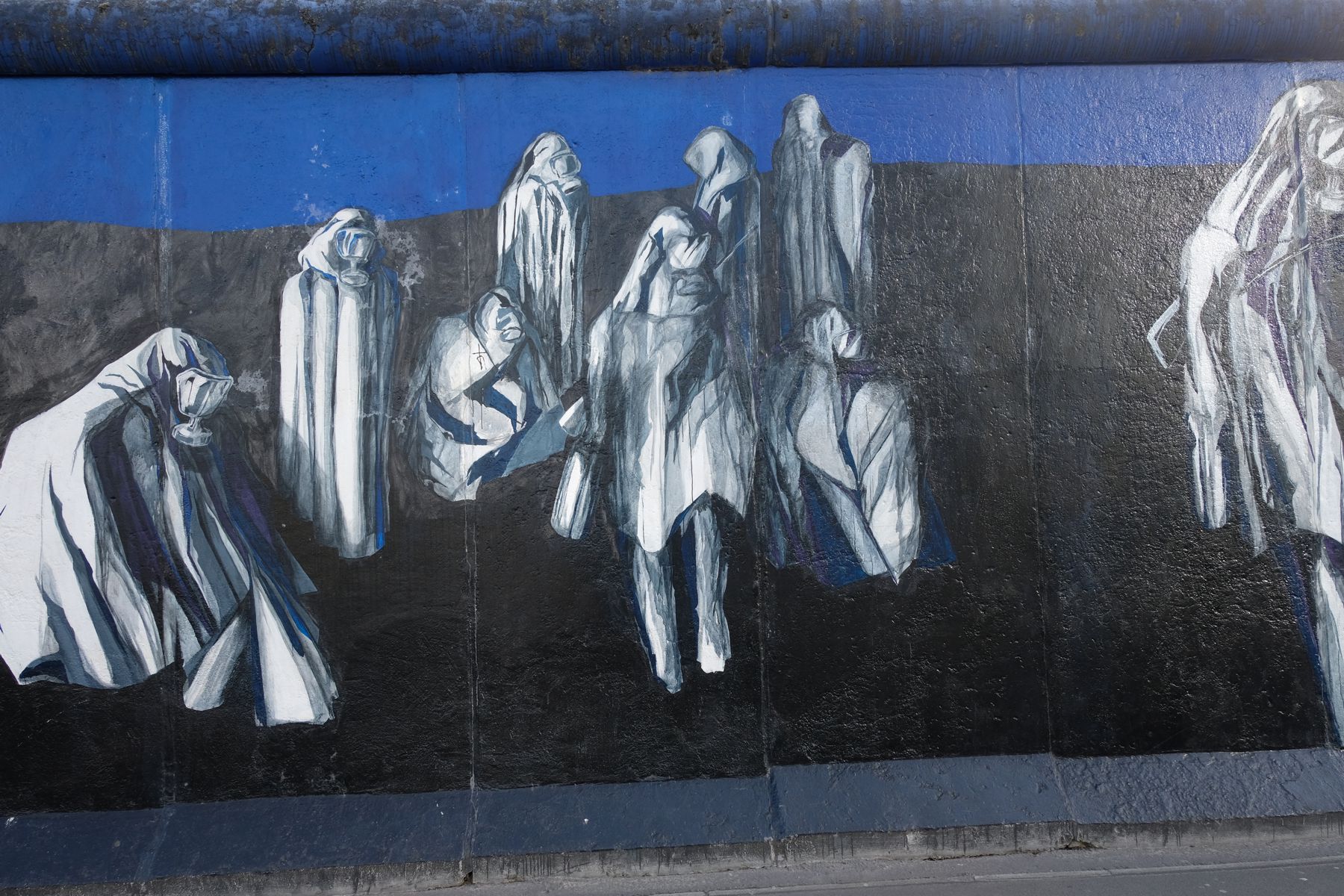
Small section of Berlin Wall decorated with graffiti.
1. The Wall Was Truly Weird
I remember encountering a quiet stretch of the wall while walking in Berlin back in '86. It was the strangest wall I had ever encountered. On one hand, it was just a stretch of concrete wall decorated with graffiti. Walls like that exist all over the world. On the other hand it somehow seemed sinister, as if an evil spirit dwelled within it. It felt dark and dangerous. And, of course, it divided a city as well as symbolised the division of a country and even a continent. I was privileged simply because I lived on the Western side. I could visit the Eastern side. East Germans, on the other hand, found it incredibly challenging to get permission to cross the wall. And, if they were caught attempting to do so without permission, they could be, and sometimes were, shot.
The Wall was also the symbol of a world divided between American led capitalist democracy and Soviet communism. When the Wall fell, more than anything else, the world knew that Soviet communism had failed and the Soviet Union was coming to an end.
Today, the Wall seems more of a canvas than a wall. The East Side Gallery is a 1.3 kilometre long stretch of the wall decorated with could be called murals or what could be called graffiti - depending on your perspective. As a free to enter, open air museum, it is worth visiting. I did and the Wall felt like, well, a wall. It no longer had that sinister feel to it. I guess the evil spirit left. Perhaps it resides in Vladimir Putin now.
2. Easterners Anxious Walking Over the Ruins of the Wall
D told me about the day the wall fell. Like most East Berliners, she knew that the propaganda was bullshit and life was much better on the other side of the Wall. She could watch West German television. Family from West Germany visited from time to time and brought gifts that could not be found in East Germany. Gifts, like basic beauty and hygiene products that could be bought at any supermarket in the West.
Nevertheless, when the Wall fell and friends talked about crossing into the West, D was reluctant and anxious about going. Why? She was afraid that she might get locked out of East Berlin where her home, possessions and family all were. Even though she knew life would be better in the West, she was scared of being locked out of the East. This feeling, I learned, was not unique to D. Loads of East Germans were initially reluctant to cross the wall for exactly the same reason. Now, they think nothing of it. Indeed, anyone under 33 (at the time of writing) was born after the wall fell.
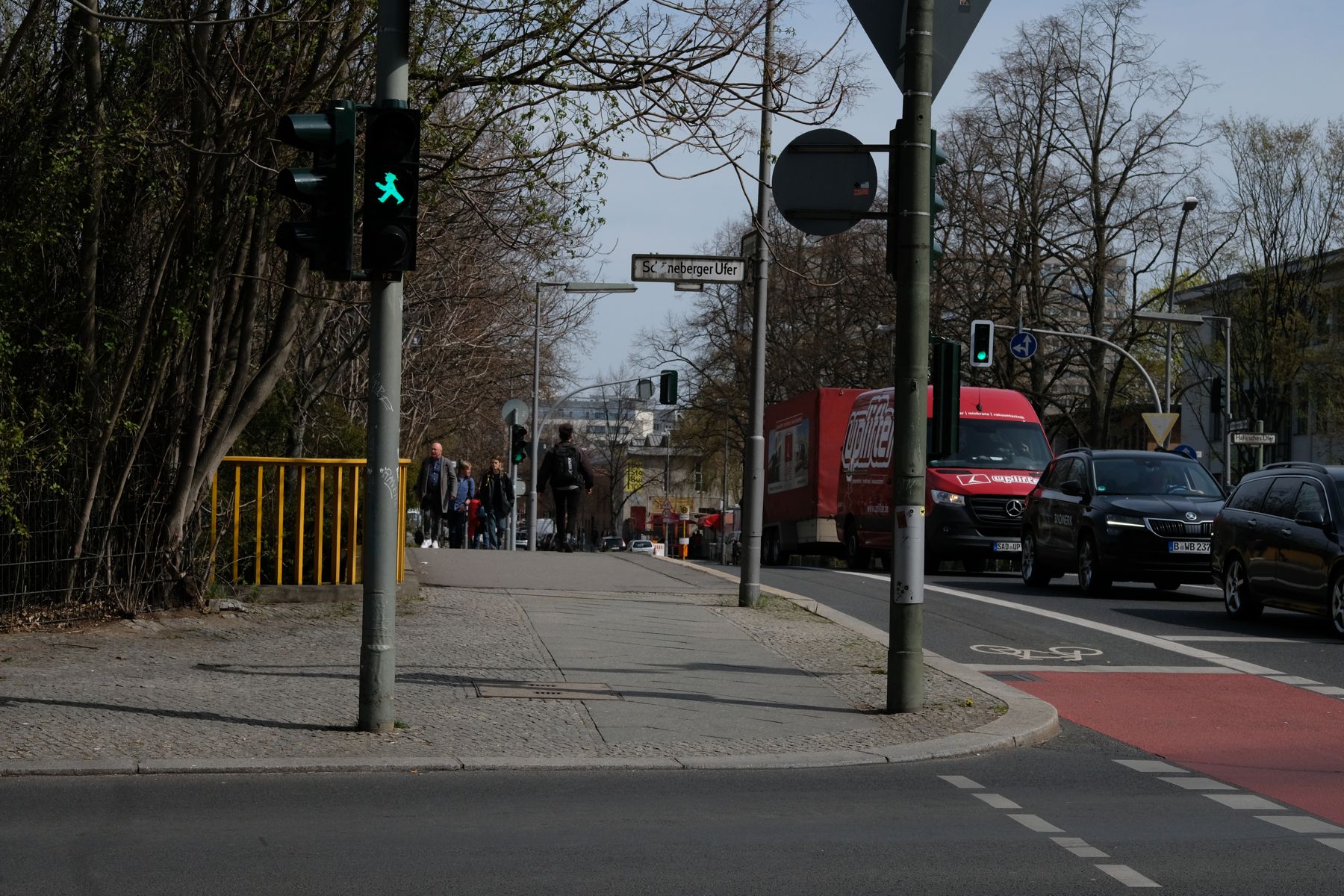
3. Pedestrian Traffic Lights
You know how traffic lights in cities have "walk' and "do not walk" lights (as in the picture above), usually with a red figure prohibiting walking across the road and a green figure indicating you are permitted to cross? Different cultures have different attitudes to these lights. In Thailand, for instance, they are purely decorative. You run across the road when the opportunity arises. Cars run you down if you make a mistake. This is understood. In Brussels, because it is the home to many nationalities, has many attitudes to these lights. When the figure is red, some people stop and wait. Others look both ways and, if no cars are coming, cross. Technically speaking, this is not legal. But, the police do not enforce it.
Germans are very strict about obeying the pedestrian crossing lights. Even in the middle of the night when there are no cars on the road, Germans will stand at an empty intersection waiting for the green figure before crossing. I reckon if it was the end of the world and the last surviving human was a German, she would still stop at a red figure and wait for it to go green before crossing.
As for me, I am a look both ways and cross if nothing is coming kind of guy. Although if it is a big intersection or there is a stern looking police officer watching, I follow the lights. At first, D was appalled by my lackadaisical approach to crossing the road. She was particularly distressed when I did this sort of thing in Berlin, perhaps still subconsciously concerned that the STASI might arrest us and strip her of her PhD or some such. However, she slowly grew used to my behaviour and by our second trip to Berlin, was behaving more like me. If we were at an intersection facing a red figure light, and no cars were coming, she would just cross. Sometimes, she wouldn't even bother waiting for me. I was - and still am - secretly proud that I had corrupted her.
4. Double Duvets
In hotels and German homes, where I have stayed, double beds typically have two single duvets on them - presumably one for each person. This is fine and dandy if you do not much like the person you are sleeping with, but not so great if you want to cuddle up with your sleeping partner. Cuddling (and other shared activities in bed), especially on a cooler evening means combining bodies and duvets in such a way that you are holding each other comfortably and covered with partially overlapping duvets. Even then, if you make the slightest movement, a duvet inevitably slides off the two of you, exposing a body part or three to the icy cold bedroom (see below). More often than not, however, you eventually give up and end up sleeping wrapped up in your own single duvet. This is probably why the birth rate in Germany is so low.
5. Keeping a Bedroom Window Open
Germans tend to be lovers of fresh air and one way of expressing this love is by keeping bedroom windows open during the night, which is fine and dandy on mild nights, but can be downright chilly on winter nights, especially if it is logistically challenging to cuddle with your partner under a pair of warm duvets (see above).
This is the reason there are no German scientist in Antarctic research buildings: they leave the damned windows open and freeze to death during the night. (Disclaimer: I don't actually know this for a fact.)
6. Cheap Housing in Berlin Myth
When I mentioned to friends that Ira and I might be moving to Berlin, they told me that property is relatively cheap there; that you could buy or rent a big apartment for a song! The thing is, it was by all evidence true a decade ago and doubly true two decades ago. Today, however, there is a shortage of property for sale and rent (Germans tend to rent their homes rather than buy them as we do in Belgium) in Berlin.
Before leaving for Berlin, I contacted a dozen real estate agencies, asking about specific properties or if they could show me some properties based on my criteria. One agent got back to me with an email and appointment. One. Three others sent me template emails and the rest ignored me completely.
Talking to people who actually live in Berlin, we found that apartments in the city are desperately hard to come by; moreover those up for sale were often rented to tenants. They were being sold as investment properties, not places to actually live in yourself. This made the available property base even smaller. Probably the only way to find property in Berlin is to make it a full time job for a year or two, being willing to grovel and exploiting contacts. For a really nice place, I'd consider offering sexual favours.
Ira and I are discussing our strategy. However, I will not share it with you. The market is just too damn competitive!
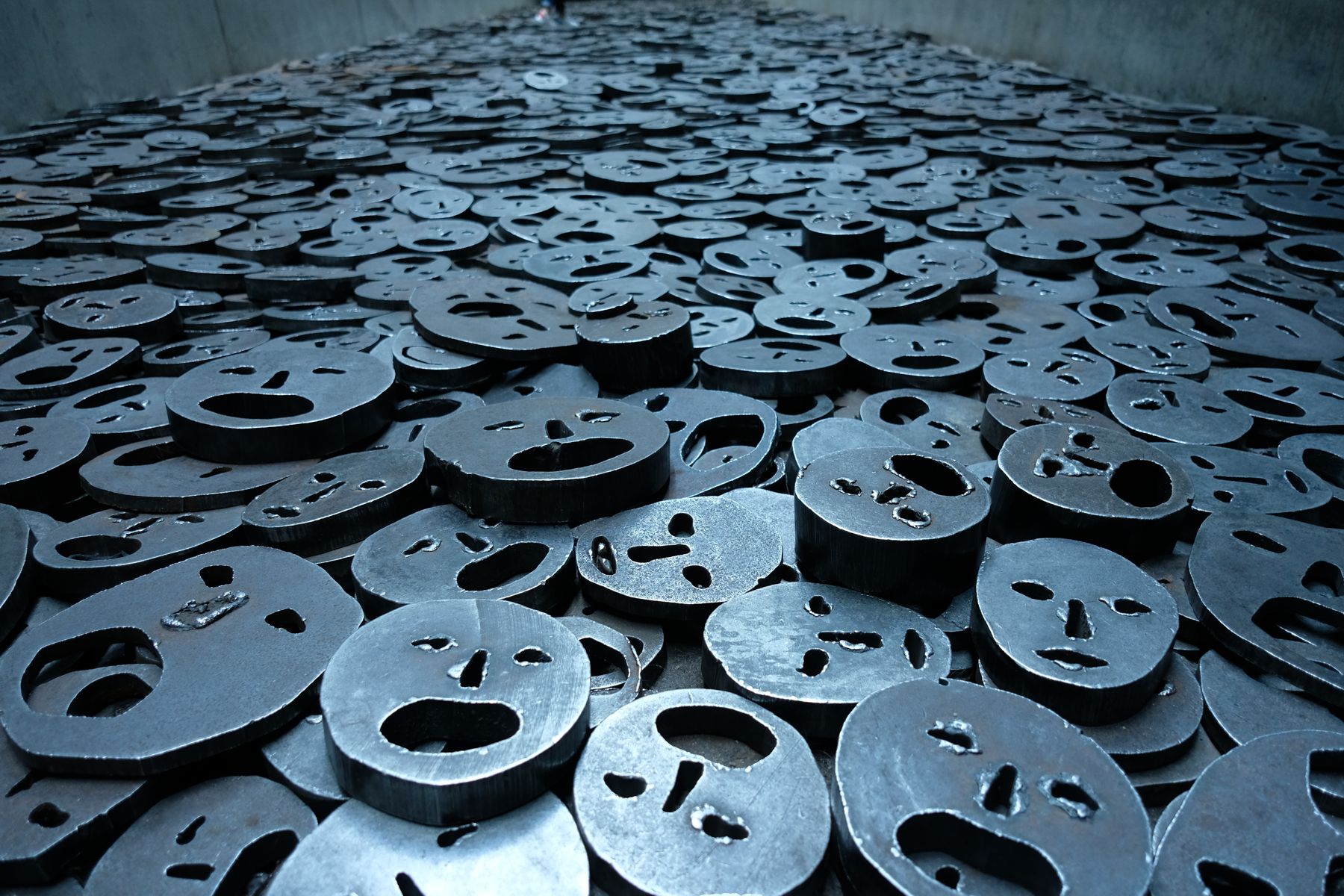
Display in Jewish Museum.
7. Acknowledgement of Holocaust
The Holocaust was truly a terrible thing. Six million innocent people died largely because of one man's hatred of Jews. This is unimaginable, inhuman and unforgiveable. Nevertheless, Germany has made an admirable effort to acknowledge their sins and make what amends they can. In so doing, they have made it much less likely such a thing could happen again in Germany. Sadly, other countries have committed atrocities that have lead to the massive loss of life and at best, these actions have been barely acknowledged. Many world leaders are still in denial about sins their predecessors committed.
As a side note, if you are in Berlin, be sure to visit the Jewish Museum. Ira recommended that I visit the museum while in Berlin. However, I must confess I was less than excited about visiting the museum. I was afraid it would be a dull collection of dioramas, artifacts and long dull text on walls - as is often the case with historical museums. Berlin's Jewish museum is absolutely nothing like this. From the architecture of the building, designed to cause discomfort and confusion, to the exhibits and art some of which is disturbing, it is truly a unique and moving place to visit. Do visit.
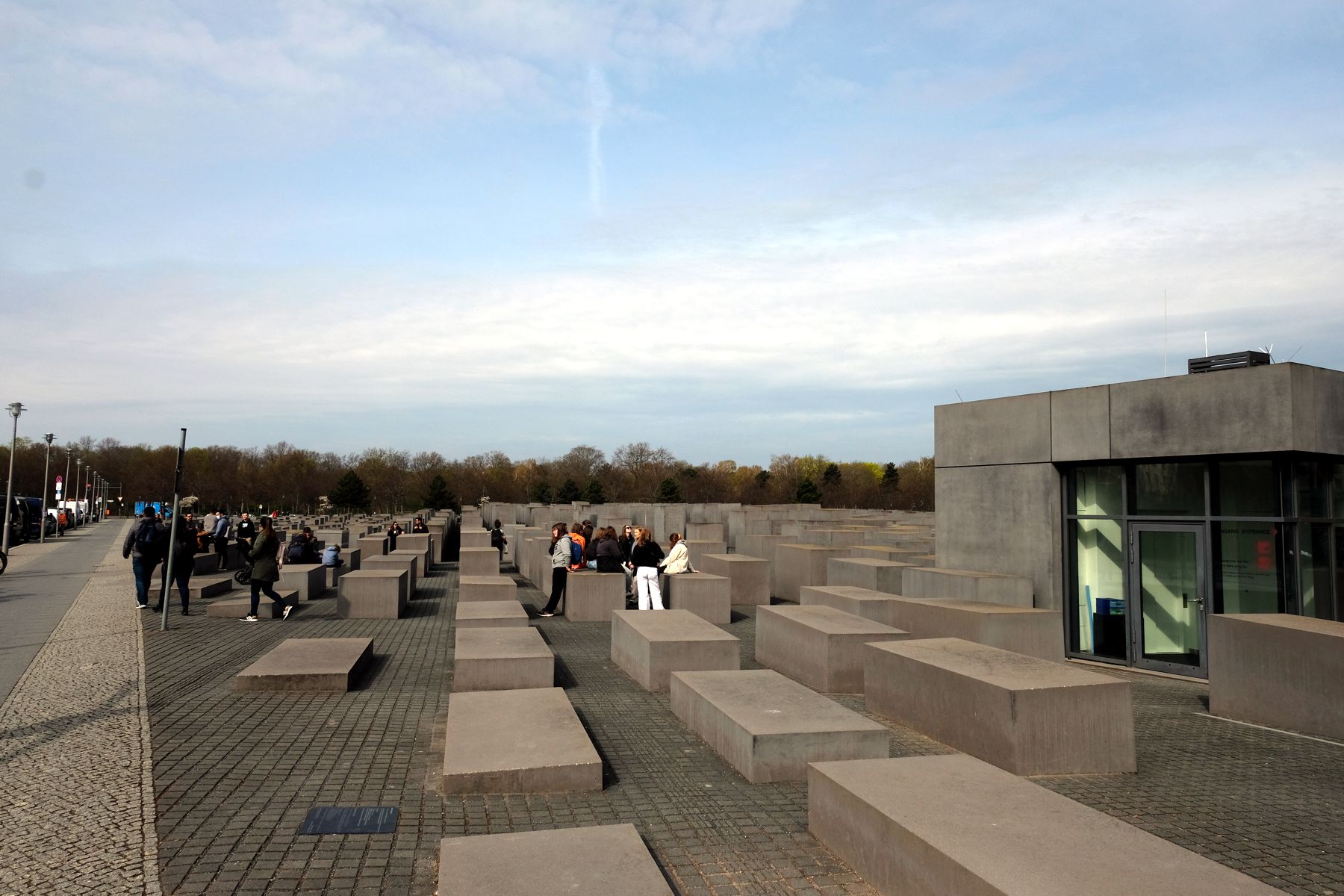
Memorial to the Murdered Jews of Europe.
Also worth visiting is the Memorial to the Murdered Jews of Europe (also known as the Holocaust Memorial - see photos above and below). It is a series of concrete rectangular shapes of various heights laid out in a tight formation. You can walk among the rectangles, you can even sit on them. Then, find a quiet place and simply reflect and absorb.
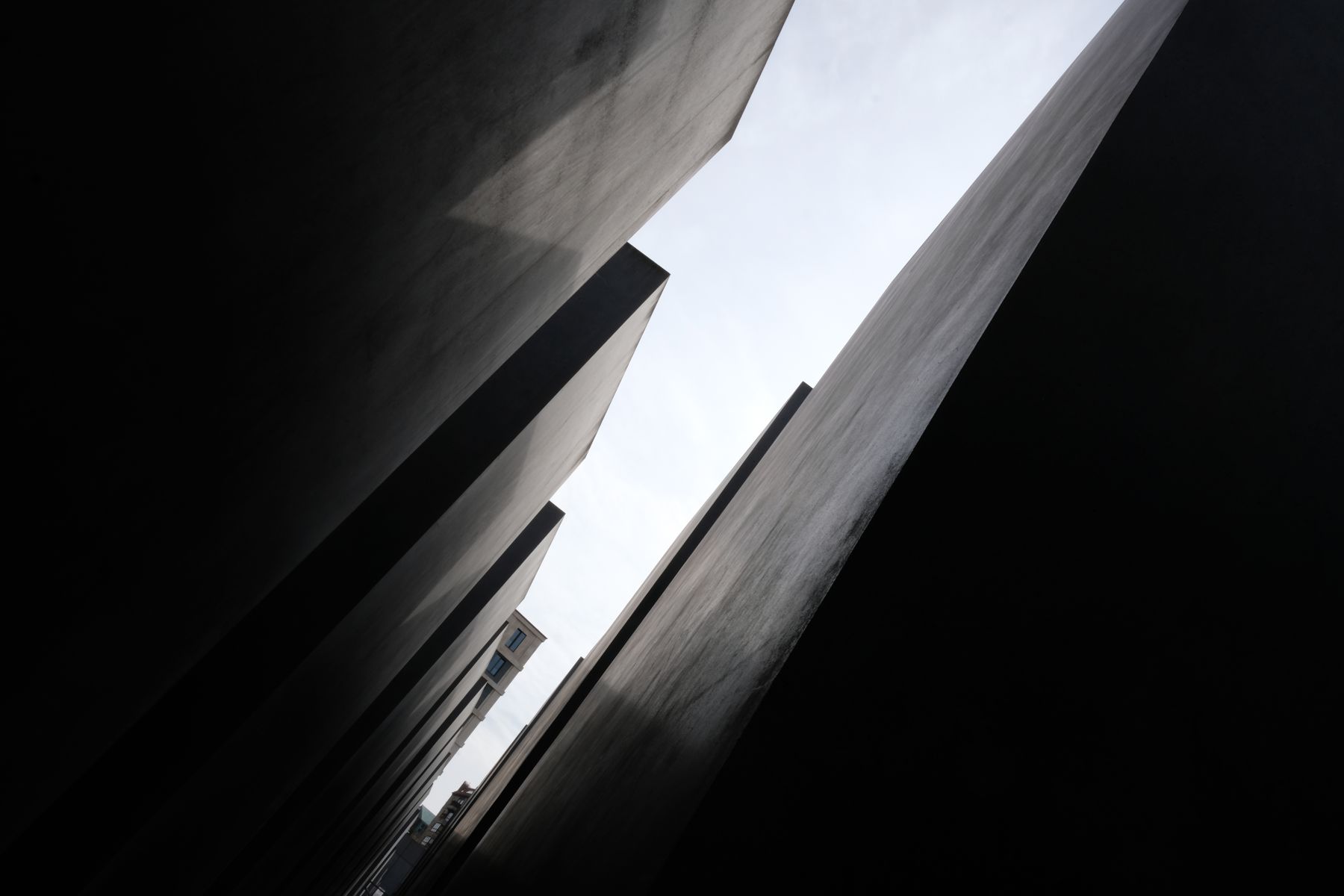
Part of the Memorial to the Murdered Jews of Europe.
8. Germans Really Mean It When They Ask "How Are You?"
When a German asks you, "How are you?" she really means it. She actually wants to know how you are. Really. Likewise, if you ask a German, "How are you doing?" she won't just say, "fine thanks, and you?" She will tell you how she is doing. I remember an earnest German chap, who had spent a number of years living in American, telling me that in America, when locals asked him how he was doing, he would start to tell them how he was doing. If they started to walk away, he would chase after them and continue to tell them how he was doing. He sensed this made the Americans he met uncomfortable and he was puzzled by their strange, sometimes panicked looks - until he finally learned that when an American asks you how you are doing, the very last thing she wants to hear from you is how you are doing. It's just an empty greeting.
To Americans, this guy's behaviour seemed strange. Indeed, such behaviour would seem odd to most anyone from the Anglo world. But, if you stop and think about it, it is us from the English speaking world that are strange. "How are you?" is a legitimate question. Actually answering it is lot less weird than using it as a meaningless greeting.
I confess, I like the German approach and try to ask people how they are doing as if I really mean it. And I do.
And Berlin
Our trip to Berlin was interesting and it was an opportunity for me to visit it without depression or being led aroud by an ex-East Berliner. It is a city that is much changed since I lived there. But, I feel it is a city still trying to find itself. On one hand, it seems to want to retain that cutting edge arty feel from the old days. On the other hand, it is again the seat of the central government. Berlin was the capital of Germany until partition, when Bonn became the capital of West Germany. Then, in 1990 after reunification, Berlin again became the capital of a unified Germany. And on yet another hand, it is a European hotspot for start ups, especially tech start-ups. Yeah, I know. That makes three hands, which seems strange, I agree. But, Berlin is a still a strange city. I reckon it needs a little longer to find itself and mature into a grown up city with just two hands.
Meanwhile, you have arty types, civil servants, politicians, entrepreneurs, people looking for work in tech start-ups and tourists all milling about together and making Berlin a dynamic, happening place. I am curious to see what will happen over the next decade or two or three.
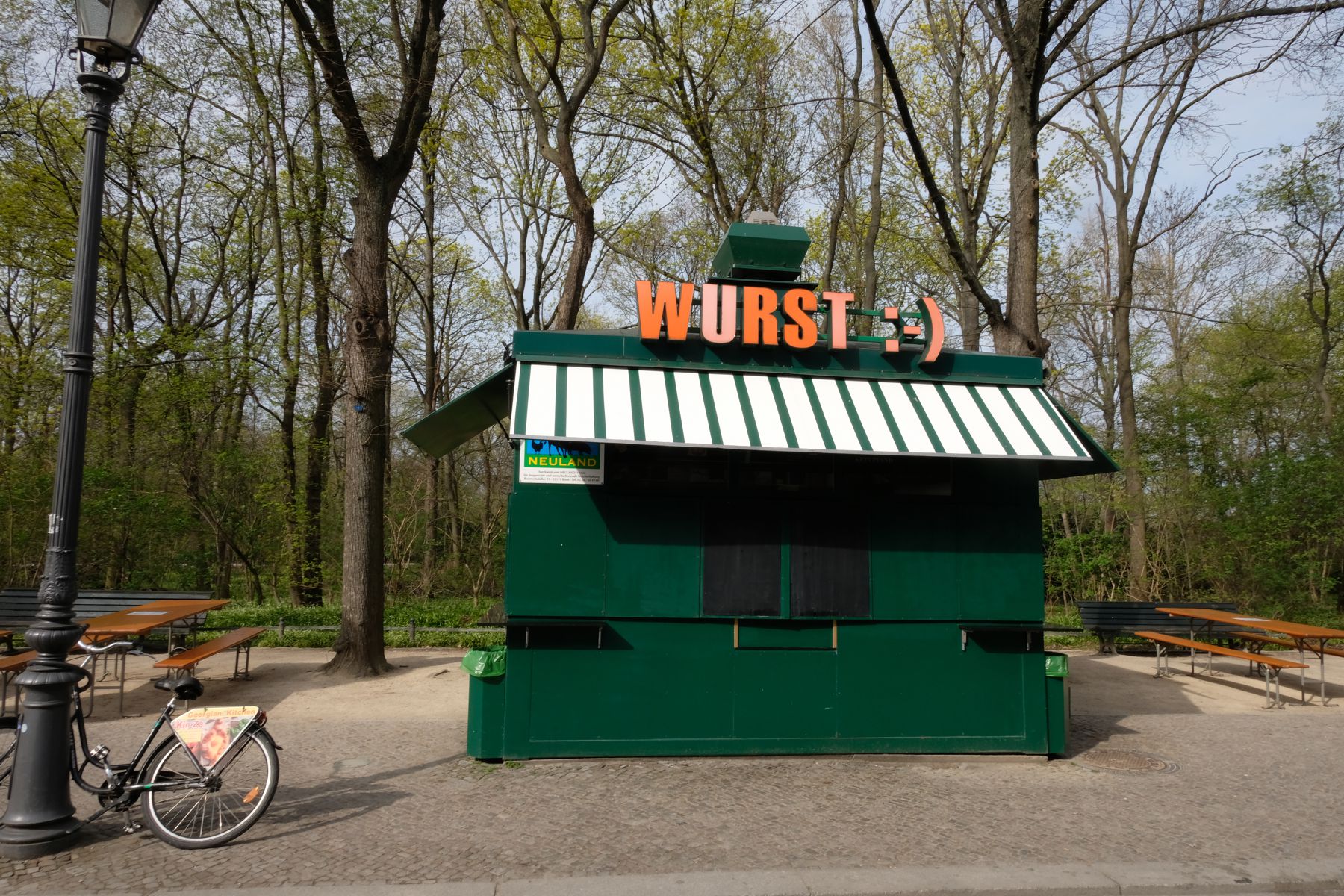
Sausage shop.
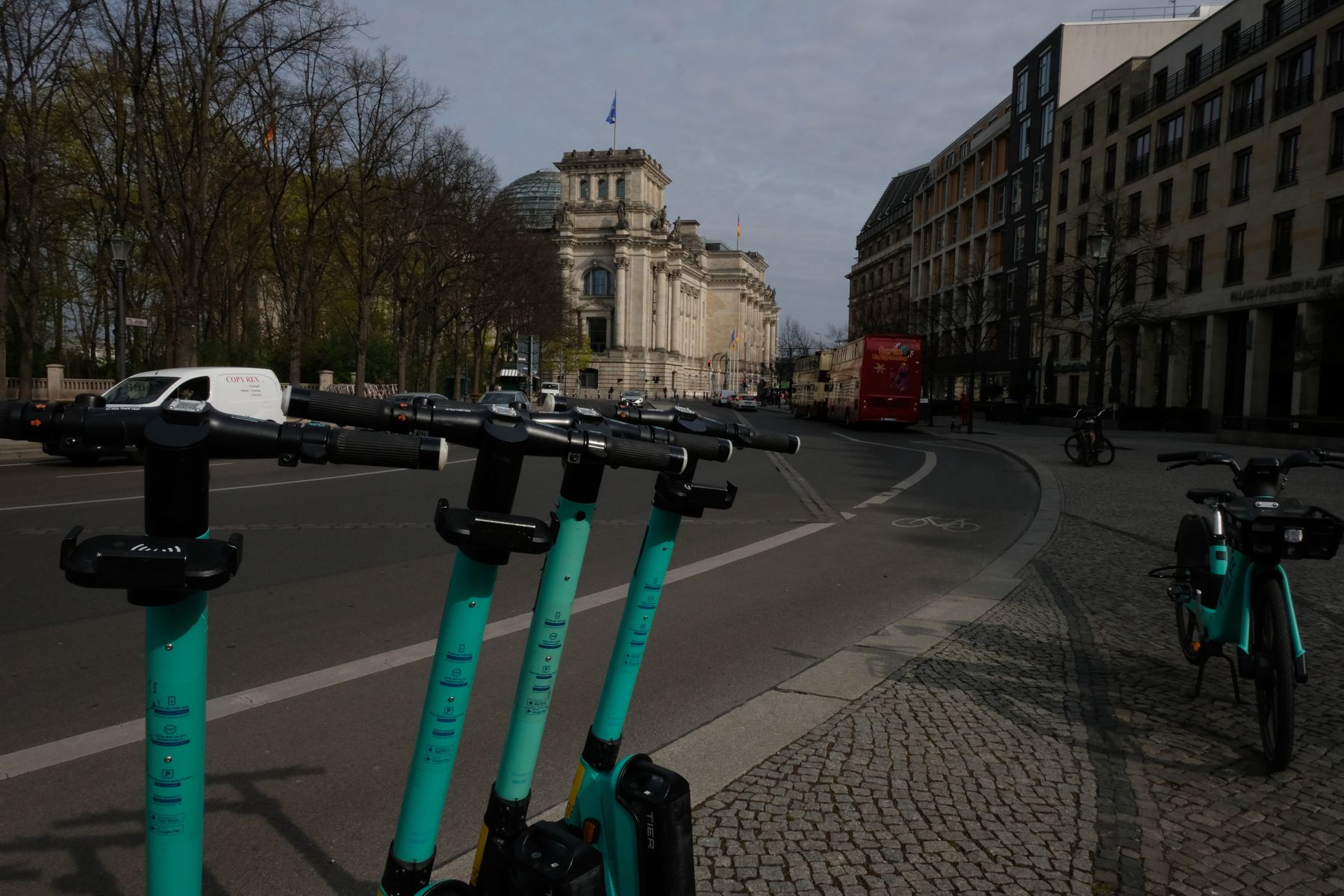
Yeah, Berlin has scooters too.
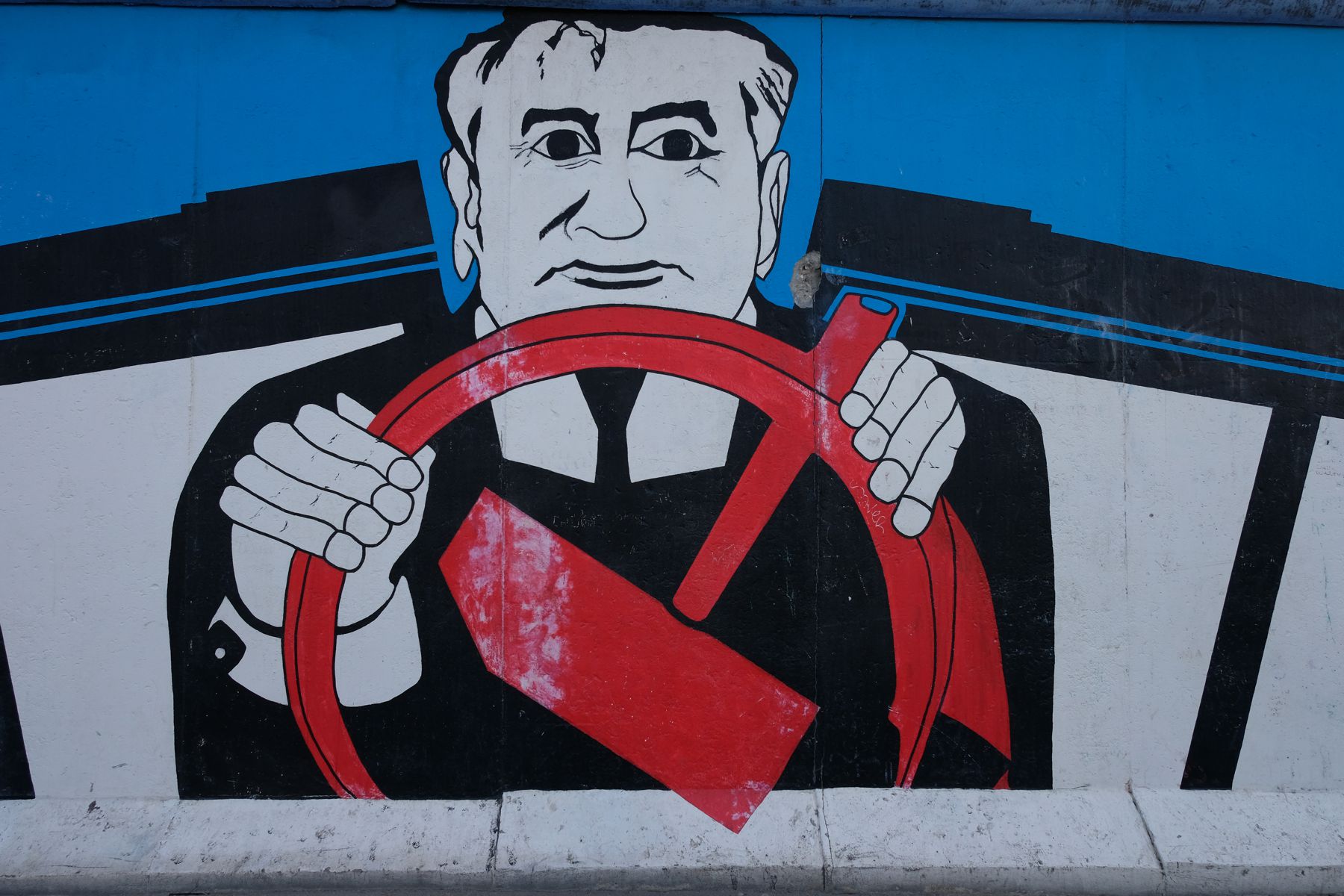
More graffiti on old Berlin Wall.
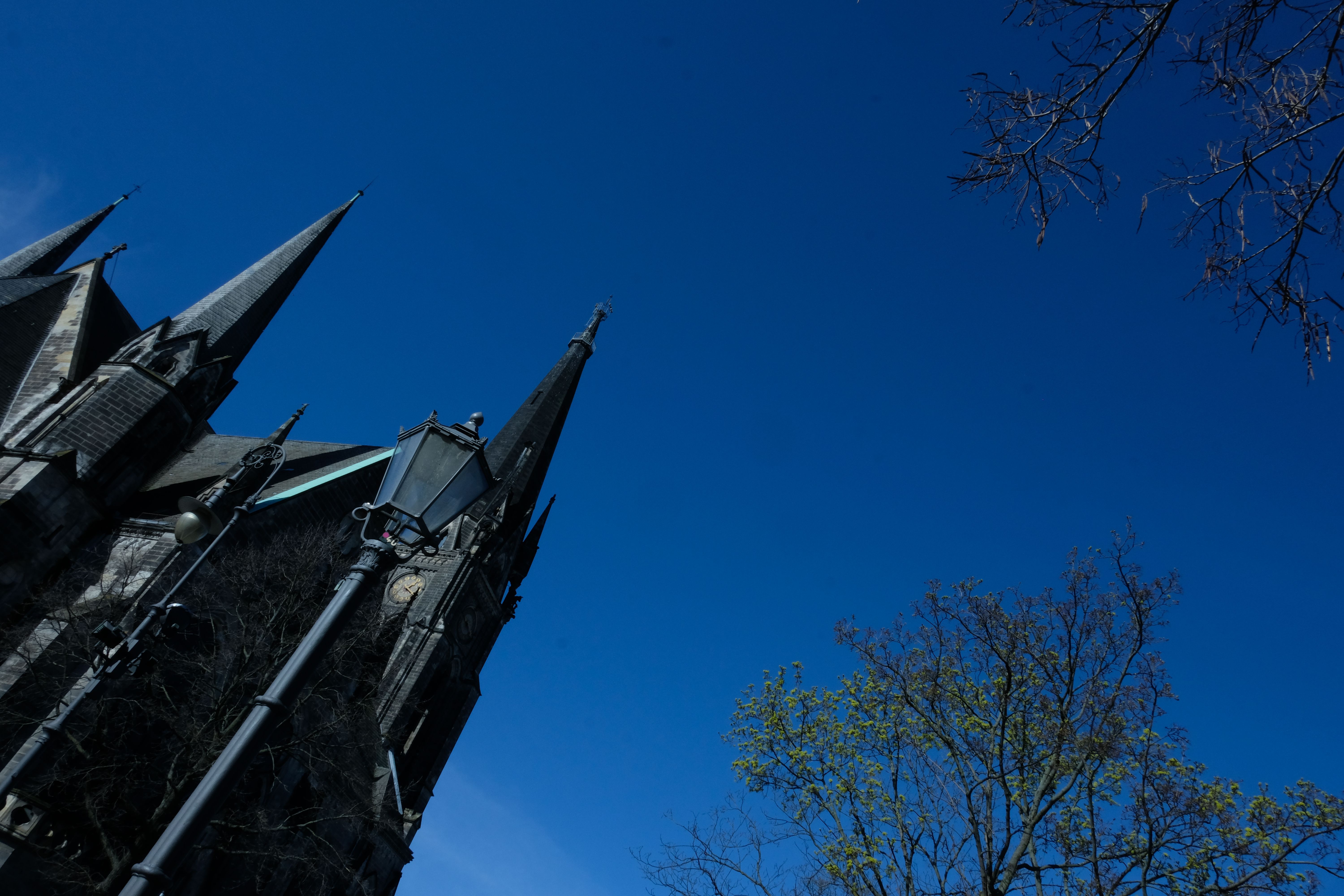
Looking up in Berlin.
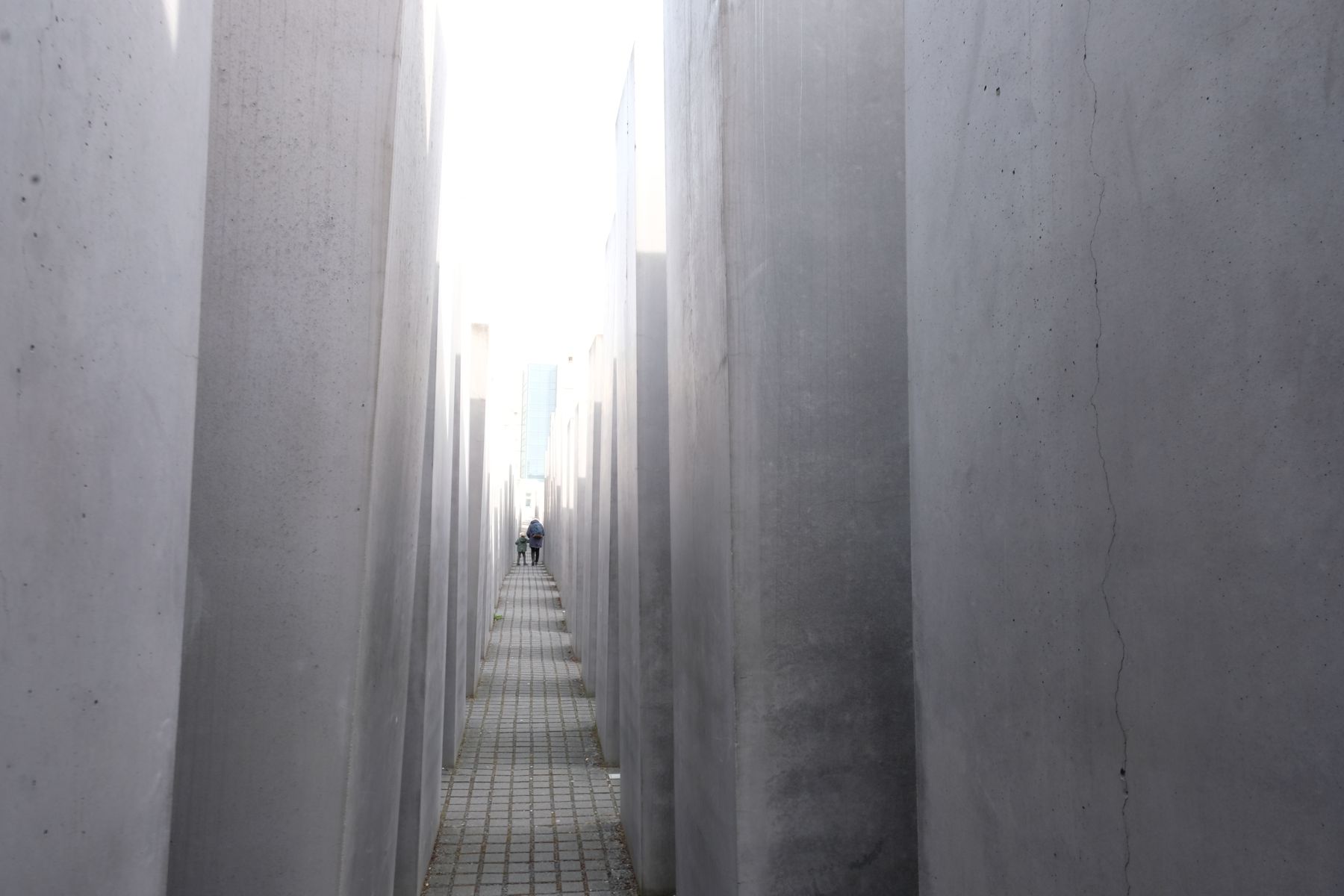
The Memorial to the Murdered Jews of Europe flooded with light
* * *
Share your feedback, thoughts and/or questions
* * *
If you enjoyed this story, please share it. I would love for more people to discover our blog.
* * *
* * *
Our latest Stories
The Queues of Paris (April 2023)
A recent visit to Paris involved standing in long queues and battling crowds. Fortunately, I have an idea about reducing crowds at tourist sites. Read it here.
Revisiting Portugal (March 2023)
Ira and I take a road trip to my one time home: Portugal.
Portuguese Memories (September 1985)
On a road trip through Portugal with Ira, I am reminded of my life in Lisbon in the mid 1980s
Fleeing to Cyprus (January 2023)
I decided to visit Cyprus off-season to do some hiking and wandering in ruins. It was a delightful trip.
The Answer Lies Just Around the corner (November 2022)
All my life, I've felt that the answer, some profound purpose in life, has laid just round the corner. Although I have experienced a lot in life, I am still looking for that corner.
All stories
Index of all the stories on this blog.




